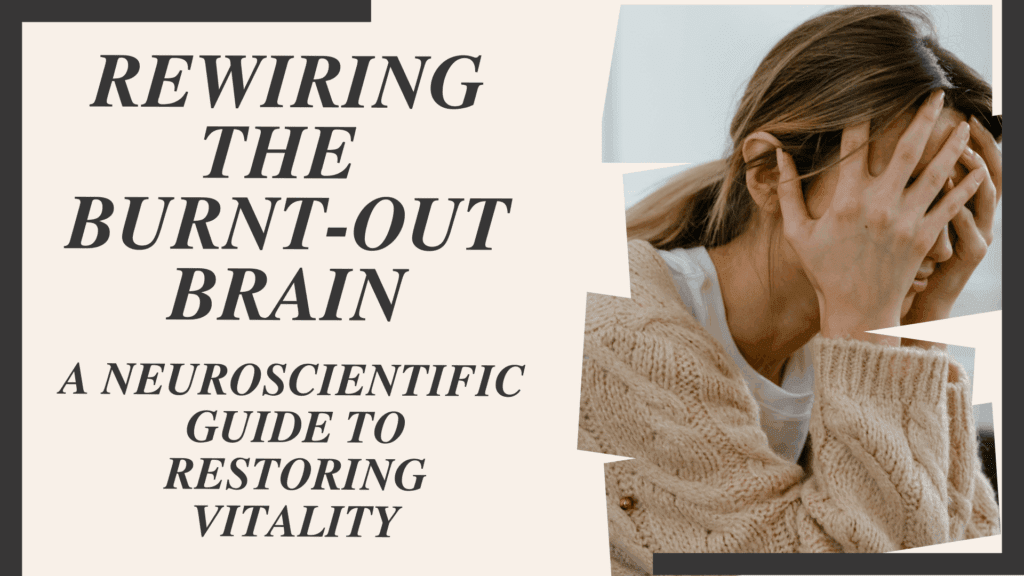As a doctor and neuroscience-based life coach, one of the areas I specialize in is burnout. I’ve seen countless high-achieving individuals walk into my office, their once-vibrant spirits dimmed by the relentless demands of modern life. They’re the CEO who can’t remember the last time they took a vacation, the working parent who feels perpetually torn between career and family, the entrepreneur who’s sacrificed their health and relationships on the altar of success.
But here’s the thing: burnout isn’t just a temporary state of exhaustion. It’s a chronic condition that can have profound effects on your brain, body, and overall well-being. Left unchecked, it can lead to a host of physical and mental health issues, from anxiety and depression to heart disease and cognitive decline. To accurately assess your level of burnout, use the maslach burnout inventory.
The good news? You have the power to prevent burnout and reclaim your vitality – and it all starts with understanding your brain.
Through my years of research and clinical practice, I’ve discovered that the key to unlocking sustainable work-life balance lies in harnessing the incredible power of your brain’s neuroplasticity – its ability to rewire itself in response to your thoughts, behaviors, and experiences.
By intentionally shaping your brain through science-backed strategies, you can literally train yourself to be more resilient, focused, and energized – even in the face of life’s toughest challenges.
In this post, I’ll be sharing the most cutting-edge insights from the world of neuroscience on how to prevent burnout and optimize your brain for peak performance and well-being. Whether you’re a high-powered executive, a busy parent, or anyone struggling to find balance in the midst of the daily grind, these strategies will give you the tools you need to take control of your brain – and your life.
So if you’re ready to say goodbye to burnout and hello to a brighter, more vibrant version of yourself, keep reading. Your journey to a balanced brain and a thriving life starts now.
The Neuroscience of Burnout: How Chronic Stress Rewires Your Brain
Signs of burnout are more than just a feeling of being overworked and overwhelmed. It’s a state of physical, emotional, and mental exhaustion that can have profound effects on your brain and overall well-being.
When you’re constantly under stress, your brain’s amygdala – the “alarm system” that triggers the fight-or-flight response – becomes hyperactive. This leads to a cascade of stress hormones like cortisol flooding your system, which can impair memory, decision-making, and emotional regulation in the prefrontal cortex.
Over time, chronic stress can actually change the structure and function of your brain, which is a clear sign of burnout and can lead to:
- Shrinkage in the hippocampus, which is critical for learning and memory
- Reduced neurogenesis, or the birth of new brain cells
- Impaired connectivity between brain regions involved in focus, planning, and impulse control
- Increased inflammation and oxidative stress, which can accelerate brain aging
The good news is that your brain is remarkably adaptable and capable of change. By harnessing the power of neuroplasticity – your brain’s ability to rewire itself in response to experience – you can counteract the effects of burnout and build a more resilient, balanced brain.

Neuroplasticity: Your Brain’s Superpower for Beating Burnout
One of the most exciting discoveries in modern neuroscience is the concept of neuroplasticity. Contrary to previous beliefs, we now know that your brain continues to change and adapt throughout your entire life.
Every time you learn something new, form a memory, or experience a new sensation, your brain creates and strengthens neural connections. This process of ongoing brain rewiring is the key to developing new habits, skills, and ways of thinking – including those that promote work-life balance and resilience to stress.
Some powerful ways to harness neuroplasticity for burnout prevention include:
- Mindfulness Meditation: A regular mindfulness practice can actually change the physical structure of your brain, strengthening regions involved in focus, emotional regulation, and resilience. By training your brain to stay present and non-judgmental, you can better manage stress and cultivate a sense of inner calm.
- Cognitive Reframing: Your thoughts have the power to shape your brain’s wiring. By consistently practicing positive self-talk and reframing stressful situations as challenges to grow from, you can literally rewire your brain for greater optimism and resilience. This is a key component of the cognitive-behavioral coaching I do with my burnout clients.
- Engaging in Novelty and Challenge: Stepping outside your comfort zone and engaging in mentally stimulating activities is like “exercise for your brain.” It promotes neuroplasticity, boosts brain cell growth, and enhances cognitive flexibility – all of which can help you adapt better to stress and change.
By intentionally choosing thoughts and experiences that promote brain rewiring, you can train your brain to be more resilient in the face of stress and less prone to burnout.
The Power of Neurogenesis: Growing Your Way Out of Burnout
Another incredible capacity of your brain is neurogenesis – the ability to grow new brain cells throughout life. While once thought impossible, we now know that the adult brain continues to birth new neurons in regions like the hippocampus, which is critical for learning, memory, and emotional regulation.
Unfortunately, chronic stress and burnout can actually suppress neurogenesis, leading to a shrinking hippocampus and impaired cognitive function. The good news is that certain lifestyle practices can dramatically boost the birth of new brain cells, helping to protect against burnout and promote brain health:
- Exercise: Physical activity is one of the most potent stimulators of neurogenesis. Regular aerobic exercise like jogging, cycling, or swimming can increase brain cell growth and improve memory, focus, and mood. Even a 30-minute walk in nature can work wonders for your brain and stress levels.
- Sleep: During deep, restorative sleep, your brain flushes out toxins, consolidates memories, and supports the growth of new neurons. Prioritizing 7-9 hours of quality sleep each night is essential for optimal brain function and burnout prevention.
- Nutrition: Certain nutrients and dietary patterns can significantly impact neurogenesis. Omega-3 fatty acids, flavonoids from berries and green tea, and the Mediterranean diet have all been shown to boost brain cell growth and protect against cognitive decline. Incorporating these neuroprotective foods into your diet can help keep your brain sharp and resilient.
By optimizing your lifestyle for neurogenesis, you can literally grow your way out of burnout and cultivate a healthier, happier brain.

Putting it All Together: A Holistic Approach to Burnout Prevention
Preventing burnout and maintaining work-life balance is a multifaceted process that requires consistent effort and commitment. By combining neuroscience-based strategies like neuroplasticity and neurogenesis optimization with proven burnout prevention techniques, you can create a powerful toolbox for resilience and well-being:
- Prioritize Self-Care: Make time for activities that nourish your mind, body, and soul. This could include exercise, meditation, hobbies, or spending time in nature. Remember, self-care isn’t selfish – it’s essential for preventing burnout and showing up as your best self in all areas of life.
- Set Boundaries: Learn to say no to demands that don’t align with your values or priorities. Communicate your limits clearly and assertively, and create space for rest and recovery in your schedule.
- Cultivate Supportive Relationships: Nurture relationships with friends, family, and colleagues who uplift and support you. Sharing your struggles and celebrating your wins with others can help you feel more connected and resilient in the face of stress.
- Find Meaning and Purpose: Reflect on what truly matters to you and align your work and life with your core values. When you have a sense of purpose and meaning, you’re more motivated to push through challenges and less prone to burnout.
As a life balance coach, I’ve seen the transformative power of these neuroscience-based strategies firsthand. By rewiring your brain for resilience, optimizing neurogenesis, and committing to holistic self-care, you can prevent burnout, achieve sustainable work-life balance, and unlock your full potential.
So what are you waiting for? Start training your brain to beat burnout today – your healthiest, happiest self is waiting on the other side.
BurnoutPrevention













